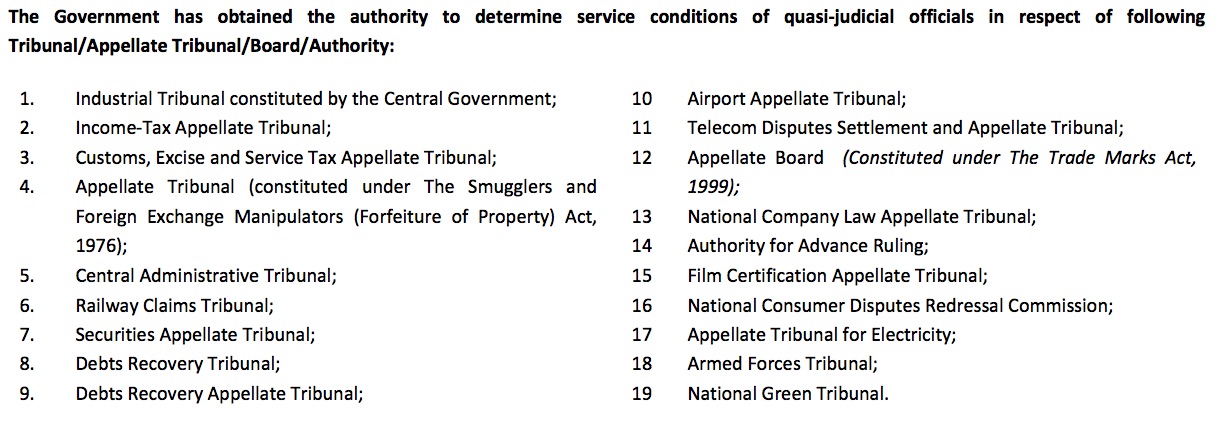14 June, 2017
INTRODUCTION
The Finance Act, 2017 (the "Act") came into effect from April 1, 2017 after the President granted assent to the Bill on March 31, 2017. The Act has made several structural changes, including making Aadhaar numbers mandatory for filing tax returns, allowing companies to make bigger, anonymous political donations and capping single cash transaction at Rs 200,000.But the most sweeping changes were merger of eight powerful and autonomous administrative tribunals with other tribunals. In addition, the Act has empowered the Central Government to determine the qualifications, term of office, salaries and allowances, resignation, removal and other terms of service of quasi‐judicial officials.
COMMENCEMENT OF THE AMENDMENTS:
The amendments to certain acts to provide for the merger of tribunals and service conditions of the members of such tribunals or other authorities are introduced in Part XIV of Chapter VI of the Act. Pursuant to Section 156 of the Act, the Central Government has notified ‘May 26, 2017’ as the date in the Official Gazette on which the Finance Act, 2017 amendments relating to merger of tribunals and other authorities shall come into force. Accordingly, Section 158 to Section 189 of the Act are notified.
HIGHLIGHTS OF PART XIV OF CHAPTER VI
The key changes introduced by the Act under PART XIV of Chapter VI are summarized below.
(I) Mergers and Restructuring of Tribunals:
Eight appellate tribunals created through various laws will now be restructured and merged and their functions will be allotted to others mentioned below:
SR. NO. / TRIBUNAL BEING REPLACED / TRIBUNAL TO TAKE OVER FUNCTIONS
1 / The Employees Provident Fund Appellate Tribunal / Industrial Tribunal (under the Industrial Disputes Act, 1947)
2 / The Copyright Board / Intellectual Property Appellate Board (under the Trade Marks Act, 1999)
3 / The Railways Rates Tribunal / Railway Claims Tribunal (under the Railway Claims Tribunal Act, 1987)
4 / The Appellate Tribunal For Foreign Exchange / Appellate Tribunal (under the Smugglers and Foreign Exchange Manipulators (Forfeiture of Property) Act, 1976)
5 / The National Highways Tribunal / Airport Appellate Tribunal (under the Airport Authority of India Act, 1994)
6 / The Airports Economic Regulatory Authority / Telecom Dispute Settlement And Appellate Tribunal (under the TRAI Act,1997)
7 / Cyber Appellate Tribunal / Telecom Dispute Settlement And Appellate Tribunal (under the TRAI Act,1997)
8 / Competition Appellate Tribunal / National Company Law Appellate Tribunal (under the Companies Act, 2013)
III Service Conditions of Quasi-Judicial of such Tribunals.
Section 184 of the Act has empowered the Central Government to make rules to provide for qualifications, appointments, tenure, salaries and allowances, resignation, removal and any other conditions of service of the Chairperson, Vice‐Chairperson, Chairman, Vice‐Chairman, President, Vice‐President, Presiding Officer or Member of the Tribunal, Appellate Tribunal or as the case may be, other Authorities.
Pursuant to Section 184 of the Act, the Central Government has recently notified the Tribunal, Appellate Tribunal and other Authorities (Qualifications, Experience and other Conditions of Service of Members) Rules, 2017 (the "Rules") through Notification bearing No. G.S.R. No. 514 (E) dated June 1, 2017.
The Rules will not be applicable to those currently serving on these tribunals. It further provides that the term of office for these members will not exceed 5 (five) years and such members will be eligible for reappointment. The age of retirement has also been amended to:
(i) 70 (seventy) years for Chairpersons, Chairmen or Presidents; and
(ii) 67 (sixty‐seven) years for Vice‐Chairpersons, Vice‐Chairman, Vice‐Presidents and Presiding
Officers.
Pursuant to Section 184 of the Act, the Central Government has recently notified the Tribunal, Appellate Tribunal and other Authorities (Qualifications, Experience and other Conditions of Service of Members) Rules, 2017 (the "Rules") through Notification bearing No. G.S.R. No. 514 (E) dated June 1, 2017.
The Rules will not be applicable to those currently serving on these tribunals. It further provides that the term of office for these members will not exceed 5 (five) years and such members will be eligible for reappointment. The age of retirement has also been amended to:
(i) 70 (seventy) years for Chairpersons, Chairmen or Presidents; and
(ii) 67 (sixty‐seven) years for Vice‐Chairpersons, Vice‐Chairman, Vice‐Presidents and Presiding
Officers.
Please click on the image to enlarge
III) Acts to be Amended
Before the Act came into effect, the acts that set up a tribunal also contained provisions of qualifications for appointment, term of office, and removal of its members. However, the Act has introduced the amendments to such legislations and pursuant to which the following acts would be modified accordingly:
Please click on the image to enlarge
Conclusion
India has number of tribunals that were created to secure the speedy disposal of service matters, revenue matters and certain other matters of special importance in the context of the socio‐economic development and progress. These tribunals have played an exceedingly important function in the current system of judiciary. On the one hand, the Government’s decision of merging powerful administrative tribunals and assuming powers to appoint and remove their chiefs, will definitely lower administrative costs and bring in more uniformity in terms of service and efficiency. However, rationalizing tribunals may undermine the authority and independence of these quasi‐judicial bodies. Since there will be an increase of the Government’s role, there could be a risk of erosion of the boundary between the executive and judiciary. Further the Act gives unchecked power to the Government, entitling them to essentially install political appointees to govern such tribunals, arguably eroding the principle of the separation of powers between the executive, legislative and judiciary. This amendment could therefore, potentially compromise the independence of such quasi‐judicial tribunals.
Prem Rajani, Partner, Rajani Associates
prem@rajaniassociates.net







